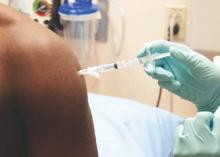Experimental vaccines to prevent the Ebola and Marburg viruses were safe, well-tolerated, and produced similar results in Ugandan adults as in U.S. adults, according to findings published Dec. 22 in the Lancet.
In a randomized, phase I trial designed to evaluate the safety and immune response of two investigational vaccines, only one severe adverse event (neutropenia) was reported and was believed to be unrelated to the vaccine.
Dr. Julie E. Ledgerwood and colleagues at the National Institutes of Health studied 108 healthy adults aged 18-50 years in Kampala, Uganda from November 2009 to April 2010. Participants were randomized to receive either the Ebola (EBO) vaccine, the Marburg (MAR) vaccine, both vaccines, or placebo at the start of the study, and again after 4 and 8 weeks (Lancet 2014 [doi:10.1016/S0140-6736(14)62385-0].
Positive T-cell antibody responses were seen for the Ebola Sudan (SUDV) glycoprotein antigen in 43% of patients in the EBO vaccine group (95% confidence interval, 25-63), 3% of patients in the MAR vaccine–only group (95% CI, 0-18), and 33% of those in the group receiving both vaccines (95% CI, 17-53). T-cell responses for the Ebola Zaire (EBOV) glycoprotein were positive in 63% of patients in the EBO vaccine group (95% CI, 44-80), 3% of patients in the MAR vaccine–only group (95% CI, 0-18), and 33% of those in the group receiving both vaccines (95% CI, 17-53). Positive T-cell antibody responses were seen for the MARV glycoprotein antigen in 10% of patients in the EBO vaccine group (95% CI, 2-27), 52% of patients in the MAR vaccine–only group (95% CI, 33-71), and 43% of those in the group receiving both vaccines (95% CI, 25-63).
“This is the first clinical trial to assess an Ebola virus vaccine and a Marburg virus vaccine in an African population,” the authors said in the report.
Additionally, “safety and immunogenicity were similar in U.S. and Ugandan populations, which is important especially for a filovirus vaccine since the people at greatest risk of the disease reside mainly in Africa,” they added.
In an editorial accompanying the study, Dr. Saranya Sridhar of the Oxford University Centre for Clinical Vaccinology and Tropical Medicine comments that this trial could “provide some insight into what might be expected from the ongoing trials of virus-vectored Ebola virus vaccines in Africa.”
The similarity of the safety profile to that of a similar U.S. trial is encouraging in its possible implications for trials currently underway in Mali, he added (Lancet 2014 [doi:10.1016/S0140-6736(14)62445-4]).
“The international response to the present Ebola outbreak is an exemplar of the speed and purpose with which clinical vaccine development can progress and has set the benchmark against which future vaccine development must be judged,” he said.
The study was funded by the U.S. Department of Defense Infectious Disease Clinical Research Program and the U.S. National Institutes of Health Intramural Research Program. The authors did not disclose any conflicts of interest.

